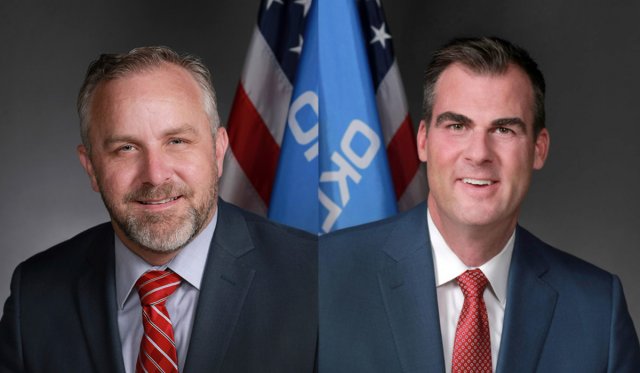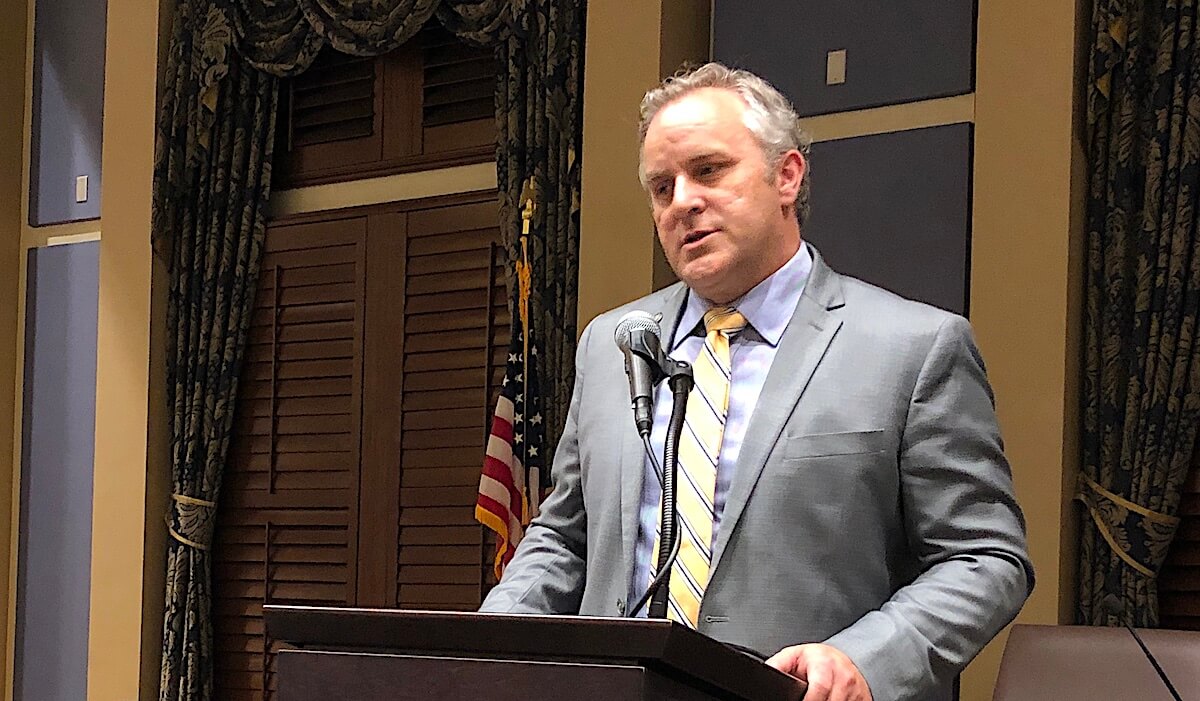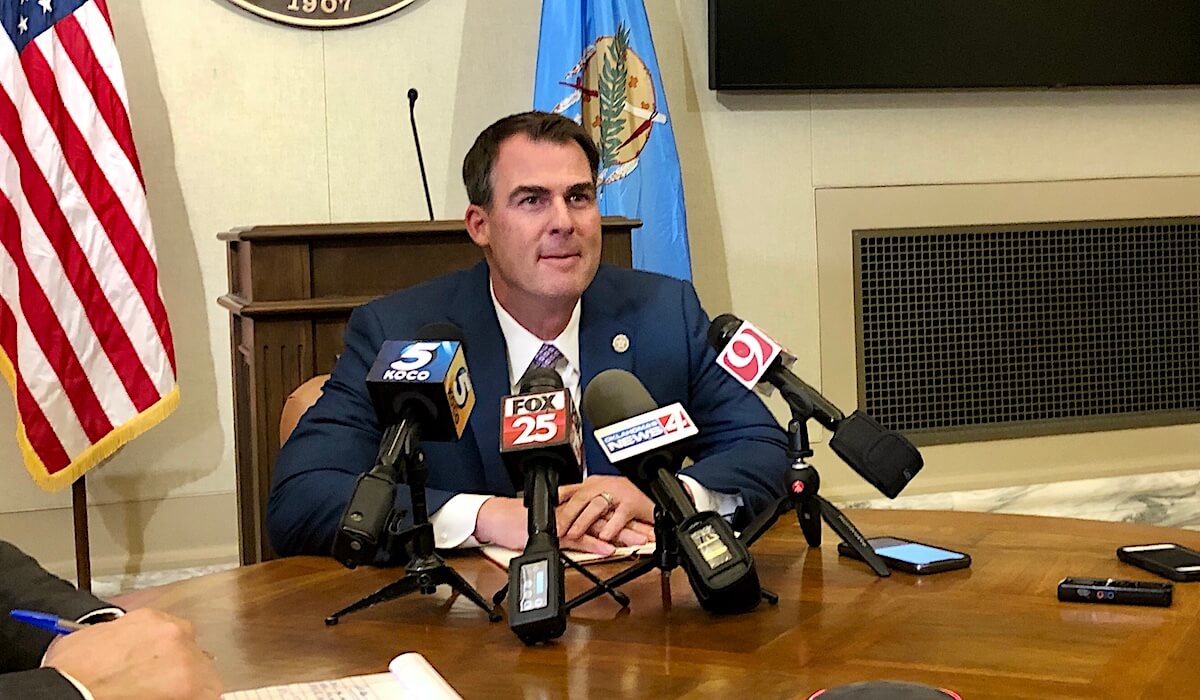

The day after the Oklahoma Legislature overrode his four vetoes of state budget bills, Gov. Kevin Stitt stood before media, announced he had “no hard feelings” and said the historic rebuke was “kind of in the past for me.”
“It played out exactly how it was supposed to. I feel fantastic, actually. I feel great today,” Stitt said Thursday, May 14. “The Legislature disagreed with me, and they have to answer to Oklahomans for that.
Stitt’s “that” referred to the Fiscal Year 2021 state budget, which the Legislature called a victory (given economic circumstances). The governor said it relied too heavily on one-time funding and betrayed conservative Republican principles.
But Oklahoma’s unprecedented 2020 legislative session was marked by tensions with the governor that extended beyond the state budget negotiations that imploded on conference calls in late March and early April.
Asked whether he has a “rocky relationship” with the Legislature, Stitt said such could be said about members of “the leadership.”
“But with the majority of the folks I think it’s fine,” Stitt said. “”I need to continue to reach out.”
Greg Treat: ‘We had a Festivus’

Around 9 p.m. Friday, May 15, Senate President Pro Tempore Greg Treat (R-OKC) stood before a small gathering of reporters for his first media availability in weeks.
Having adjourned session for the year — unless other vetoes need to be considered for an override — Treat offered his strongest critique of Stitt to date, particularly when it came to the Senate decision not to confirm the governor’s nomination of Gary Cox as commissioner of health.
“The chief executive decided to hire someone for a position [who] was not statutorily qualified, and he did that with the Department of Health and also did that with the Commissioner of the Land Office,” Treat said. “And (the governor) did not even think to talk to legislative leaders, much less any legislator whatsoever.”
Treat said he discussed his frustration with those nominations during a two-hour conversation he recently had with Stitt at the governor’s residence.
“We had a Festivus. We had an airing of grievances,” Treat said, referencing a famous fictional holiday that caused drama in 2015 among members of the Legislature. “I enjoyed my conversation with the governor. He and I philosophically see things a lot the same. I have not appreciated some of the veto messages and some of the language about the Legislature. I wish we could have worked more closely this year, but we didn’t.”
Indeed, Stitt and lawmakers found themselves further apart as the 2020 session progressed, trading critical soundbites about the budget and privately feuding over the appointments of Cox and Commissioner of the Land Office director Brandt Vawter. Also facing the need to have statute changed for him to meet the required qualifications, Vawter resigned in March “pretty soon after I had a conversation with the governor,” according to Treat.
In the end, the Legislature also chose not to change the law for Cox, whose nomination to head the long-beleaguered Department of Health frustrated Republicans and Democrats because he did not possess the requisite academic qualifications.
“I think you have have to respect that you are not a one-man show when you are chief executive. It’s not like a chief executive — in fact, I need to stop using that language,” Treat said. “When you are the governor, you have other people you have to play in the sandbox with. You can’t just unilaterally make decisions and promise that statutory language will be changed at your discretion. That’s not meant to be inflammatory. That’s meant to say, ‘Please respect the processes in place. Please respect the constitution and statutes.'”
Stitt said the only concerns told to him by members of the Senate dealt with the academic qualifications — which were tweaked last year for other state positions.
“What you have to understand is, everything is not malicious. There are so many appointments. I am so busy trying to move things forward, I don’t stop to kind of think of some of the small things,” Stitt said. “I didn’t think of that. I apologized to them. I said, ‘Listen, I’m sorry, I’ll make it up next time. I didn’t realize I was supposed to do that. I’m a new governor.'”
In a May 12 conversation with reporters, Stitt told media the Senate’s job is “to confirm” nominees.
“The executive branch is supposed to run those state agencies — and we’re doing a great job — and the Senate is supposed to confirm them. That’s their job,” Stitt said. “But it just feels a little bit like politics that you’re not going to confirm some guy that has done a great job leading us through this during the middle of a pandemic. Let’s confirm him for a year, let’s do something to get me through this.”
Treat noted the Senate’s job is to give “advice and consent,” words the Senate leader said the governor should take seriously.
“I think it’s unfair to individuals you may hire to take on these roles to make an assumption that the Legislature will just jump to when you make a decision,” Treat said. “We had just changed those requirements last session. Rep. (Mark) Lepak (R-Claremore) and I are the ones that changed the Health Department (laws), and we left those requirements in place. So there was a conscious decision by the Legislature to leave those qualifications.”
Treat said he is “very open” to changing his mind and having discussions with other lawmakers when Stitt wants to make policy changes.
“If that restricts the governor’s ability to hire the most qualified person, let’s have that conversation. But don’t just assume that because you’re the governor I’m going to fall in line,” Treat said. “I like him. I respect him. We are in the same party, and our philosophies line up quite well, and I hope to repair whatever damage has been done to the relationship. Our personal relationship is fine, but the institutional relationship between the governor and the Senate and the Legislature at large, I hope that it improves, and I will make steps to that end. But I won’t allow the Legislature to be disregarded as a co-equal branch of government.”

Floyd: Nominees ‘need to meet the qualifications’
Senate Minority Leader Kay Floyd (D-OKC) also spoke with media late Friday night, and she offered a similar analysis of the Cox nomination situation.
“There was never any dispute that Gary Cox did not meet the statutory requirements. He interviewed with some of us after he was the governor’s choice, and it was never anything other than civil interviews. He is a good guy,” Floyd said. “But the bottom line is that once the governor was made aware that he did not meet the statutory requirements (…) we believed that the governor [needed] to find somebody who does. And rather than do that, we were told, ‘We want you to just change the qualifications.'”
Floyd said the ongoing COVID-19 pandemic serves as an example of times when having a nominee meet academic requirements matters.
“I believe that when we are asked to confirm or support nominations, especially for these high positions, they need to meet the qualifications,” Floyd said. “We don’t want to see education and experience qualifications removed from these high positions. We want to see them filled. So let’s find people that fill those positions instead of trying to change the rules to get somebody in that you want.”
Earlier in the week, Stitt said the Senate’s decision not to confirm Cox “puts us in a bind” and that Cox had been succeeding in combating COVID-19.
“I believe the data speaks for itself. We have done a great job in managing this pandemic,” Stitt said. “He has 40 years experience, not only in teaching public health and also running two public health agencies.
“It’s just disappointing.”




















